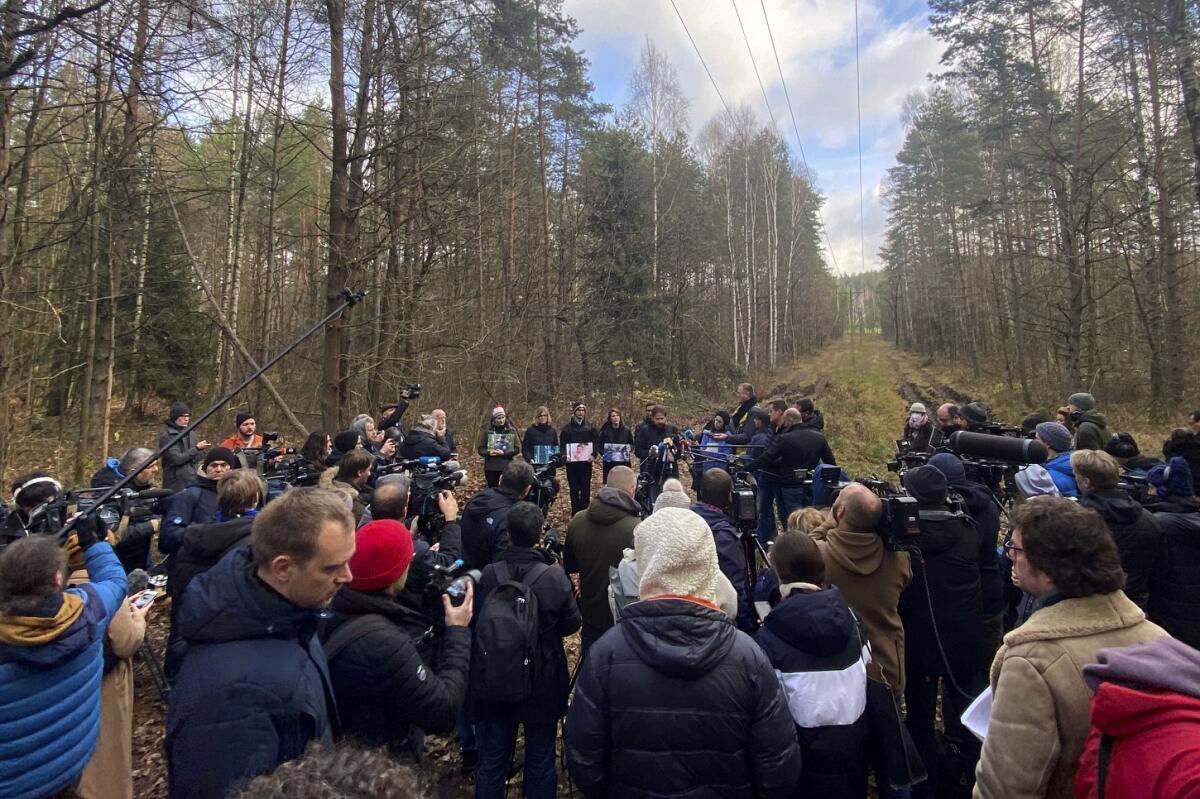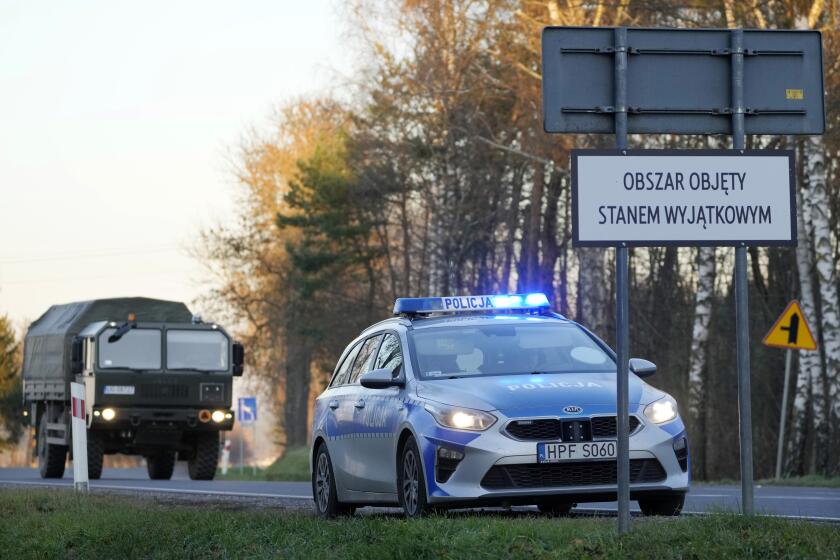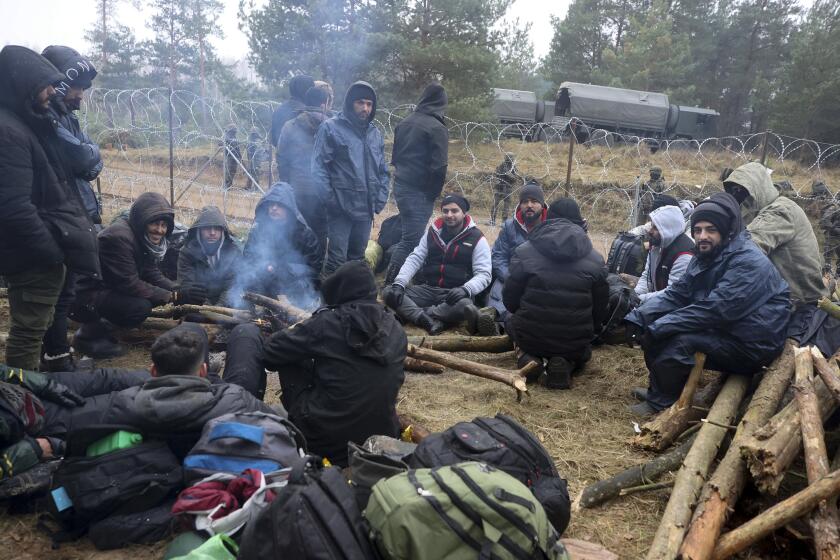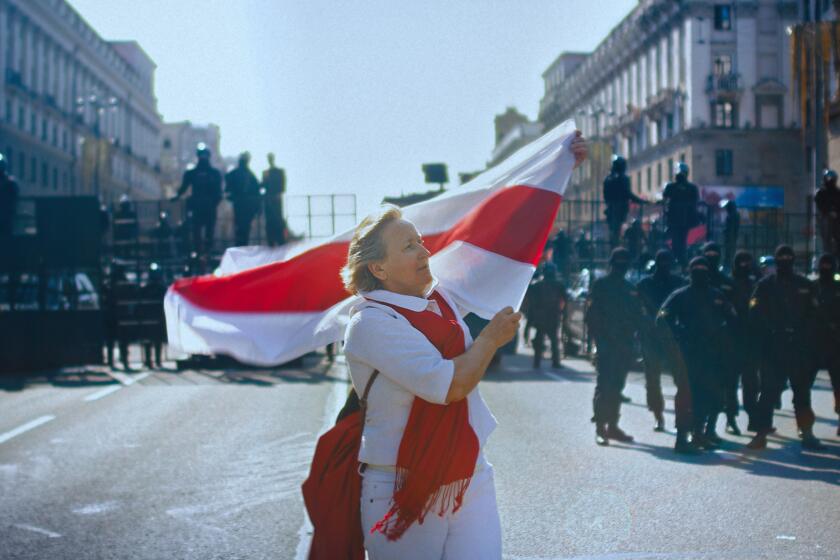Turkey halts flights for some Middle East citizens amid Belarus-EU migrant standoff

- Share via
WARSAW — Turkey on Friday stopped selling tickets to Iraqi, Syrian and Yemeni nationals wanting to fly to Belarus, which in recent months has become a key launching point for migrants and refugees trying to enter the European Union illegally.
The EU has been pressing airlines to stop bringing people from the Middle East to Belarus’ capital, Minsk, where Belarusian authorities allegedly lure them with promises of easy transit to the EU.
Thousands have slipped into bloc members Poland, Lithuania and Latvia since the summer, and many others are stuck in the border area, sleeping in freezing weather.
The crisis follows deteriorating relations between the EU and Belarus, whose authoritarian leader, Alexander Lukashenko, won a sixth term last year in an election most of the world has denounced as rigged.
The EU said it received confirmation that Iraqi Airways, which halted flights to Minsk in the summer, will not resume them. The EU commission also said it has spoken about the matter to Flydubai, Turkish Airlines, Royal Air Maroc, Air Arabia, Emirates, Qatar Airways, Etihad, Middle Eastern Airlines, Oman Air and Egypt Air.
“All these airlines have strongly condemned any form of human trafficking,” said Stefan De Keersmaecker, EU commission spokesman for transport.
Citing Friday’s decision by the Turkish civil aviation authority, Belarusian airline Belavia said it would immediately stop transporting citizens of Iraq, Syria and Yemen on its Istanbul-Minsk flights.
Nevertheless, Belarus opposition figure Pavel Latushka told the Associated Press that Belarus has increased flights to Minsk from the Middle East, with about 40 a week from Istanbul, Damascus, Dubai and Beirut scheduled until March.
On Friday alone, 10 flights from Turkey, Egypt, Lebanon and the United Arab Emirates landed in Minsk, said Latushka, a former Belarus culture minister.
According to Latushka and Belarusian human rights groups, in Minsk migrants are being taken to hotels and other accommodation sites — depending on how much they have paid. Once a group is formed, they are brought to the border, facilitated by Belarusian authorities and law enforcement officers, Latushka said.
Hundreds of migrants are massed at the Belarus-Poland border in what the European Union calls a deliberate attempt by Belarus to destabilize the bloc.
Among the migrants are Iraqi Kurds and Syrians fleeing conflict, persecution or poverty. Many aim to reach Germany or other Western European countries.
The situation is threatening to develop into a humanitarian crisis as winter approaches in the forested, boggy border area. It is also creating another point of tension between the West and Belarus’ government — which enjoys backing from neighboring Russia.
On Friday, Russia sent paratroopers to the Grodno region in Belarus, which borders Poland, in a show of support for its ally. Moscow also sent nuclear-capable strategic bombers to patrol over Belarus for two days this week.
EU and Polish officials have accused Lukashenko of facilitating illegal border crossings in retaliation for sanctions the EU imposed on his government for its brutal crackdown on dissent after last year’s elections.
NATO on Friday condemned Belarus’ “hybrid actions” using migrants at its borders with alliance members Latvia, Lithuania and Poland.
“These callous actions endanger the lives of vulnerable people,” the 30-country North Atlantic Treaty Organization said in a statement. “We will remain vigilant against the risk of further escalation and provocation by Belarus.”
German federal police say 1,246 unauthorized entries to Germany “with a connection to Belarus” were recorded in the first nine days of November. In all, there have been 9,087 such entries so far this year.
Fears that the authoritarian leader of Belarus is using migrants as a weapon to destabilize the European Union put new strains on the 27-nation bloc.
Polish authorities said up to 4,000 people remain just across the border in Belarus, and Polish border guards rebuff numerous attempted crossings each day.
Hundreds of people, including families with children, are in makeshift camps on the Belarusian side, facing subzero temperatures at night. Poland is fortifying its side of the border.
Start your day right
Sign up for Essential California for the L.A. Times biggest news, features and recommendations in your inbox six days a week.
You may occasionally receive promotional content from the Los Angeles Times.
The Belarusian Red Cross said Friday that it had sent six vehicles with aid to the border area and asked for donations of warm and rainproof clothes, blankets and hygiene products for migrants.
The World Health Organization said it sent an expert team to assess migrants held in reception facilities in Lithuania and found that 60% needed some form of medical treatment.
The organization’s Europe regional director, Dr. Hans Kluge, said he was “very concerned” about the people who are stranded at the border.
“Women and children are sleeping outdoors in the bitter cold. Several people have already died. And COVID-19 cases are rising sharply across the region,” he said.
A Polish official said tension with Belarus is not expected to ease soon. Pawel Soloch, the head of the National Security Bureau, said Poland faces “a psychological, hybrid war, waged consciously by centers that want to weaken or even ultimately destroy our country.”
Poland’s Border Guards said they stopped 223 illegal entry attempts Thursday, down from a record high of almost 1,000 last month.
Aliaksei Paluyan’s documentary “Courage” follows a trio of actor-activists from an underground theater group during pro-democracy protests in Belarus.
The Defense Ministry said a “small team” of U.K. military engineers were on a reconnaissance at the border to “explore” how the NATO allies can best strengthen it.
Poland has asked Frontex, the EU border agency, for assistance in returning migrants to their home countries.
Frontex chief Fabrice Leggeri said Thursday that reports of gunshots fired from the Belarusian side of the border mean it would “not be a safe place to deploy an operation.”
Reported incidents at the border are very hard to verify. Independent journalists face limits to their reporting in Belarus, and a state of emergency in Poland’s border zone prevents members of the news media from entering the area.
More to Read
Sign up for Essential California
The most important California stories and recommendations in your inbox every morning.
You may occasionally receive promotional content from the Los Angeles Times.













